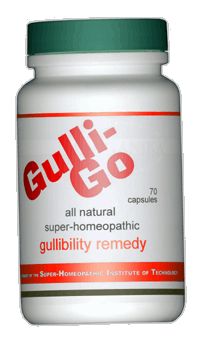GulliGo, the all-natural super-homeopathic gullibility remedy.

What is Homeopathy?
This is only intended to be a thumbnail sketch of homeopathy. For more information, see the Further Reading section on this page.
Homeopathy was created by a German physician, Samuel Hahnemann (1755-1843). There are two primary ideas in homeopathy, the "law of similars" and dilution.
The law of similars is the idea that if you want to cure a disease or alleviate a symptom, you take a small amount a substance that, in large amounts, would produce in you the same symptoms as the ones you are trying to cure. So, for example, if you wanted to create a homeopathic remedy for nausea, you would use a small amount of a substance that causes nausea.
Hahnemann believed that the effect of homeopathic remedies increased as the amount of the medicinal substance was decreased through dilution. Today, we know that many homeopathic remedies are so dilute that it is extremely unlikely that any given quantity of the remedy contains even a single molecule of the original substance. However, homeopaths believe that the water with which the remedy is diluted (for water-soluble substances) retains a kind of "memory" of the original substance.
Except for super-homeopathy, homeopathy is the safest type of treatment available anywhere**. Homeopathic preparations produce far fewer side-effects than the drugs of mainstream western medicine ***. Moreover, many homeopathic remedies, taken in large quantities, may be especially effective in treating disorders such as dehydration.**** However, we do not recommend using them for that purpose in case they are contaminated or adulterated.
For more detailed and scholarly information about homeopathy, please visit this page and others at homeowatch.org
*There is no guarantee that the homeopathic remedy you've purchased has not been adulterated with undeclared drugs, as has been known to happen. It also seems reasonable to us that you should be concerned about whether any harmful organisms have grown in the remedy since its manufacture.
**Homeopathic preparations are very safe, provided that 1) you do not have a serious or potentially-serious condition requiring real medical care, 2) that the homeopathic remedy is not contaminated with real but undeclared drugs (this has been known to happen) and 3) that the remedy was prepared without any sort of harmful mold or fungus or bacteria having had the opportunity to get into it and grow between the time the remedy is prepared and the time that you consume it.
***Obviously, the risk of side-effects from medicine can be dramatically reduced by avoiding medication entirely, which is what homeopathy amounts to, except in those cases where actual drugs have been added to the homeopathic remedy but not declared on the label. If you don't take medicine, the medicine won't produce any side-effects in you. Unfortunately, there will then be no opportunity for the medicine to be of any benefit to you, either.
****A homeopathic preparation is probably pure water, or so close to it that the difference doesn't matter, if the manufacture of the "remedy" began with a water-soluble substance and if it has not become contaminated and if it has not been adulterated.